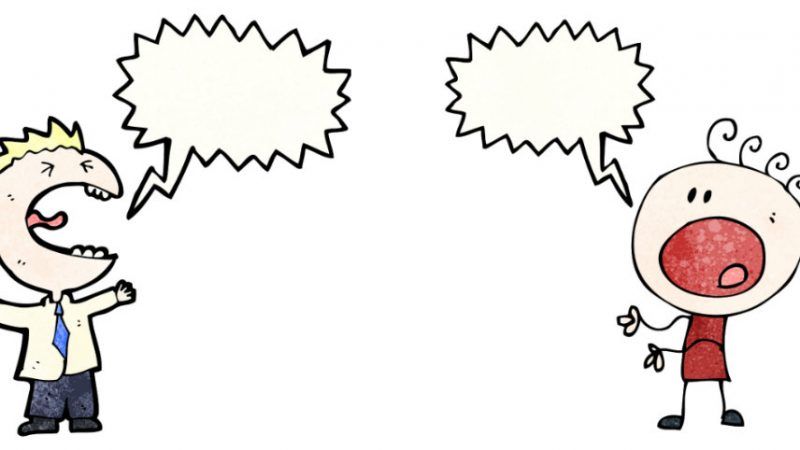If Civility Is Out of Style, Where Do We End Up Next?
Yearning for the days when interrupting your debate opponent was considered the height of incivility.

During the 2012 election, this writer was appalled by the loutish behavior displayed by incumbent Joe Biden in his vice presidential debate against GOP challenger Paul Ryan, as Biden smirked and interrupted his way through the contest. In fact, my outraged column argued that Biden's behavior was "an affront to civility" because of its bullying nature. Civility doesn't meaning rolling over, but it does mean behaving with a little decorum.
I laughed out loud after coming across that long-forgotten diatribe. It brought to mind a term from the late Daniel Patrick Moynihan of New York: "defining deviancy down." Basically, the Democratic senator argued that as society becomes accustomed to deviancy, societal standards are lowered. What seemed outrageous yesterday, is accepted today. Life begins to resemble a game of limbo. How low can you go?
I'm not the first one to use that phrase in the current environment, but that six-year-old debate wouldn't even be noteworthy today, given the antics of the current president and his foes. It's pretty clear from social media that the president's crudity and personal attacks are not a flaw in his presidency, but one of its high points. Many conservatives are thrilled to have someone who isn't playing by Marquess of Queensbury rules.
Many leftists—including folks who have shouted down conservative speakers on college campuses—now argue that Donald Trump's administration is such a fundamental threat to our democratic order that it's OK to harass members of his administration. "(I)f you see anybody from that Cabinet in a restaurant, in a department store, at a gasoline station, you get out and you create a crowd," said U.S. Rep. Maxine Waters, D-Los Angeles.
Although some Democrats castigated Waters, most people on both sides instinctively point to the other side as an example why it's OK that "our" side did something uncivil. It even has a term: "whataboutism." And conservative backers of Trump routinely chide "Never Trumpers" for trying to hold the president up to traditional standards of decency.
For example, former Republican Education Secretary William J. Bennett argued in 2016 that conservative Trump critics "suffer from a terrible case of moral superiority and put their own vanity and taste above the interest of the country." After hearing those comments on Fox News, I knew that the battle over civility was lost. Bennett, after all, is author of "The Book of Virtues," which sought to instill in young people some timeless principles.
The conservative National Review quoted Bennett's previous words to shame him for those comments about moral superiority: "Good people—people of character and moral literacy—can be conservative, and good people can be liberal. We must not permit our disputes over thorny political questions to obscure the obligation we have to offer instruction to all our young people in the area in which we have, as a society, reached a consensus: namely, on the importance of good character, and some of its pervasive particulars."
Now, that's a sentiment with which I agree, but one that is out of favor. Even some religious leaders have so thoroughly embraced the president that they've let their moral voices atrophy. The same folks who told us that character is what really matters, perhaps only believed that to be true when it comes to Bill Clinton and other politicians they don't like. That's not a virtue. It's hypocrisy.
But what about Hillary and the Left and the warriors of political correctness? So round and round we go. As I write this, by the way, I'm celebrating two major Supreme Court victories that came about largely because of Trump's victory and his appointment of Neil Gorsuch to the U.S. Supreme Court. Last week, on 5-4 votes, the court tossed aside the requirement that public-sector workers pay union dues and invalidated a noxious California law that forced pro-life crisis pregnancy centers to provide pro-abortion information to their clients.
Both decisions uphold freedom of speech, which is a foundation of a peaceful and civil society. But why can't we still criticize the president's assault on other aspects of civil society? Some of his supporters argue that "politics is binary." In other words, there are only going to be two real choices on any presidential ballot. But if that's the case, then we always need to pick a side rather than maintain a consistent standard lest we abet our political enemies.
It's easy to see where that kind of endless grudge match might lead. A new poll from Rasmussen Reports found that 31 percent of Americans believe that another civil war is likely in the next five years. We all see the anger and viciousness that has infected all manner of American discourse. I don't believe a war is by any means likely, but I'm fearful of the kind of discourse we might find acceptable by the start of the next presidential election.
Steven Greenhut is Western region director for the R Street Institute. He was a Register editorial writer from 1998-2009. Write to him at sgreenhut@rstreet.org.


Show Comments (235)